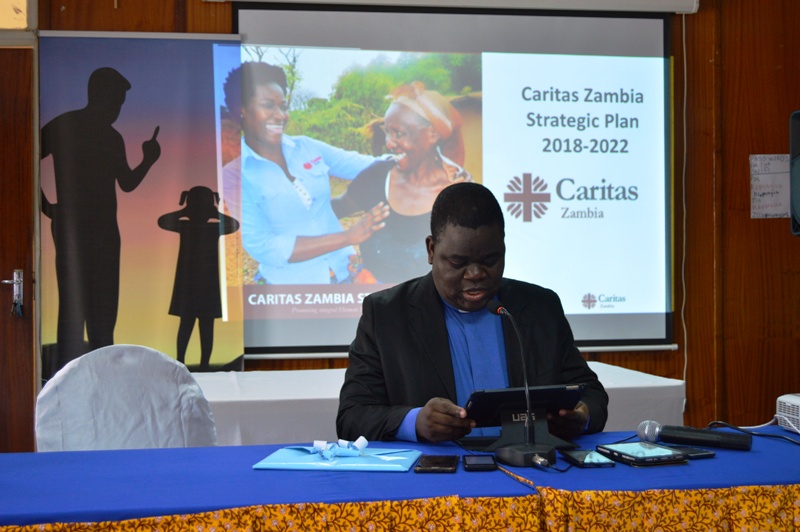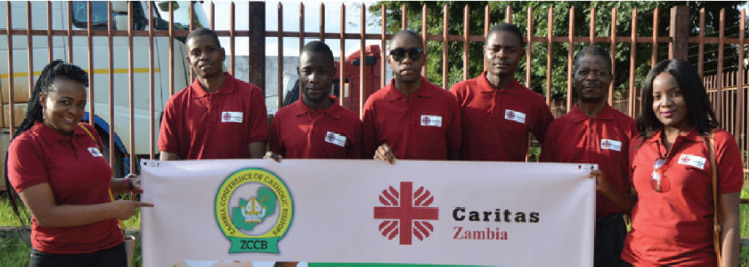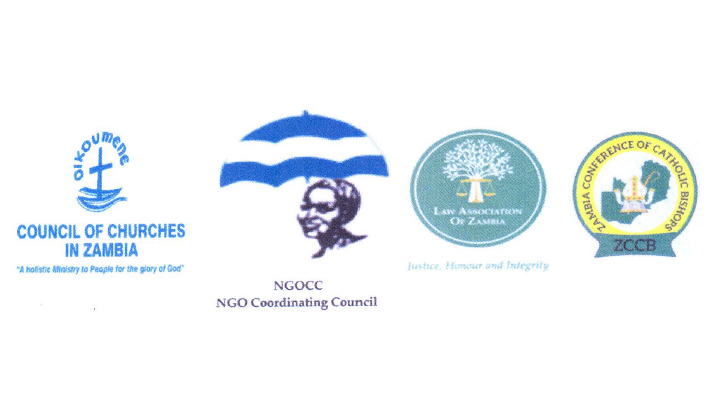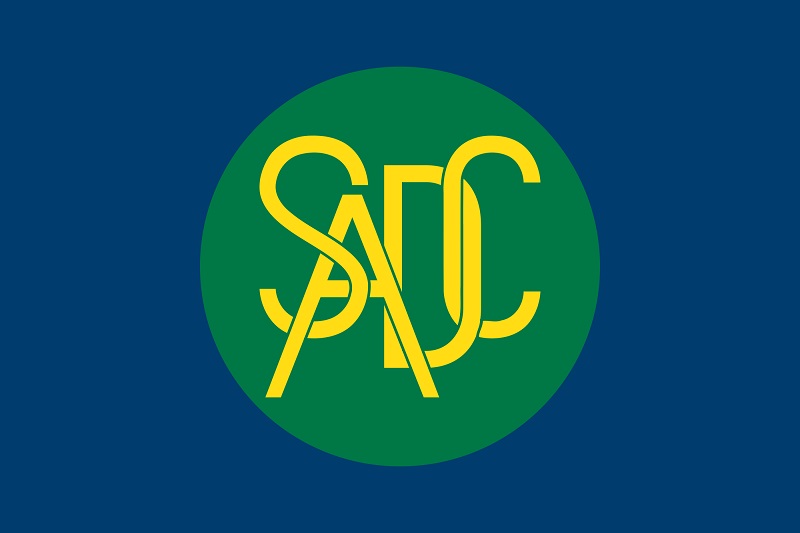The identified strategic issues have been clustered around four main areas which also form the proposed programmes namely- Economic and Social Accountability, Democracy and Governance, Livelihoods and Climate Change Adaptation and Conflict transformation and Peace Building. In addition, there is a fifth programme which provides support to all the other four programmes and is called Organisational Development. The programmes highlight the changes that Caritas Zambia would like to see (impacts and outcomes) for the next five years starting 2018- 2022:
Introduction
On behalf of the Zambia Conference of Catholic Bishops (ZCCB), I wish to, first of all, thank each and everyone of you for making time to come and witness the official launch of the new Strategic Plan for Caritas Zambia. For us, this is a visible sign of your remarkable commitment and valuable support you have always rendered to the Church through Caritas Zambia. Despite being a public holiday, you have elected to come and once more demonstrate the fact that you are our all-weather friends and Strategic partners in the noble work of promoting integral human development by advocating for social justice and genuine peace in the Zambian Society. In so doing, you have enabled us to follow the footsteps of our Lord Jesus Christ who unveiled his Mission in the words of Prophet Isaiah: “The spirit of the Lord has been given to me, for he has anointed me. He has sent me to bring good news to the poor, to proclaim liberty to captives and to the blind new sight, to set the downtrodden free, to proclaim the Lord’s year of favour” (Luke 4:18-19).
In 2016, we launched the ZCCB strategic plan (2017-2026) which led to the rebranding from Zambia Episcopal Conference (ZEC) to the Zambia Conference of Catholic Bishops (ZCCB). This was done to highlight the Catholic identity of the Bishops’ Conference. I am therefore pleased to note that at least many people are slowly but surely getting used to our new name, ZCCB rather than ZEC.
Caritas Zambia would like to express its deepest appreciation to the many individuals and organisations that supported and helped to complete the development of this 2018 - 2022 Strategic Plan document.
In doing so, we express our indebtedness to Ms. Mpala Nkonkomalimba, the consultant who facilitated and guided the process of developing this plan and its theory of change from the initial stages to its completion. Her appropriate challenges for the staff to think strategically and call on our innovative capacity helped us to re-shape our focus and responses to the socioeconomic, political and cultural challenges that Zambia is facing at the moment.
This Research Study is a product of two phases of intensive fieldwork conducted over the total period of four (4) weeks. The research presented here is limited by access to data and by the duration of fieldwork. However in dealing with the issues which emerged during the field visits, we tried our best to maintain impartiality: measures include, consulting a wide range of stakeholders and reasonably thorough literature review. There is still great potential for further research on this topic in the sampled areas.
ACKNOWLEDGMENTS
Publish What You Pay Zambia and Caritas Zambia would like to acknowledge the hard work and commitment of the key researchers Mr. Mtwalo Msoni and Mr. Edmond Kangamungazi assisted by Ms Lwizya Chanda and Mr. Sindikani Sovi for their commitment to the successful completion of this research. We would further like to thank Publish What You Pay Zambia member organizations and cooperating partners for their support and input onto the final validation of the research findings. Many thanks also go to the cooperating partners that provided financial support that made the completion and publication of this analysis paper possible more specifically the Civil Society Environment Fund and Finish Embassy, their support throughout the process was nothing less of exceptional.
Find and download the entire research report here: http://caritaszambia.org/index.php/publications/research-reports/file/124-challenges-women-children-youth-face-in-pre-post-actively-mining-areas-a-comparative-case-study-of-kabwe-chavuma-and-solwezi
STATEMENT ON NATIONAL DIALOGUE
1. Ladies and gentlemen, welcome to this brief Press Release presentation and we wish you all compliments of the season.
2. Since we are still in the Christmas season, on behalf of the Council of Churches in Zambia (CCZ), Evangelical Fellowship of Zambia (EFZ) and Zambia Conference of Catholic Bishops (ZCCB), we avail ourselves of this opportunity to wish you and through you the nation at large a grace-filled time and God’s abundant blessings in this new year and indeed always.
3. The theme and message of Christmas is presented to us by St. Luke the Evangelist when he quotes the angel who appeared to the shepherds: “I bring you news of great joy to be shared by the whole people. Today in the town of David a Saviour is born to you; he is Christ the Lord.” St Luke continues, “With the angel there was a great throng of the heavenly hosts praising God in the words, ‘Glory to God in the highest heaven and on earth peace to those of good will’” (Luke 2:10-14). Therefore, joy and peace are the themes of Christmas.
4. The source of the Christian joy, happiness and peace is the fact that we belong to God and participate in God’s life. Therefore, we must respect and reverence each human life and each other as members of God’s household. The greatest gift we Christians can give to the world is the joy and peace proclaimed by the angels. In fact, the birth of Christ marked a definitive reconciliation between humanity and God. Therefore, we are called to live as a reconciled people.
5. In the Bible, peace means love, forgiveness, reconciliation, good will and good relationships between people. This is the good news meant for people of all races, pigmentation, religions, tribes, political affiliation and ideologies. This is the peace we wish for our nation Zambia. However, there can be no peace without justice at personal as well as at all levels of society.
6. True dialogue means a change of heart, attitude and behavior. It is a project, an on-going process and effort. It is the way of life for us Christians which should be heard in our words, seen in our faces and actions because it is in our hearts. Lack of peace hurts everyone especially the weak, the elderly, the poor, women and children. It hurts us Christians because we are essentially brothers and sisters of Jesus Christ who identifies himself with the same poor and the suffering.
7. Despite the public pronouncements that Zambia is a peaceful country, the reality on the ground is different due to many acts of injustice, a growing culture of corruption, incidences of violence and utterances out of deep-seated hatred. We therefore earnestly appeal to all our political leaders to stop insulting each other or anyone who does not agree with their political opinion and start genuinely to respect fellow political players as legitimate opponents with their constitutional right to hold their political opinion and to propagate it among the general public. It demands that all political party leaders declare and enforce zero tolerance or political violence and to bring culprits to book by handing them over to law enforcement institutions. It means that all political leaders must give the planned for ‘national dialogue’ a chance to succeed by committing themselves to dialogue without preconditions with a view to level the playing field. These leaders of political parties must restrain themselves and their members from making inflammatory or irresponsible statements.
8. We also call upon media houses to refrain from sensationalism and polarization of people or political institutions; let them not join the irresponsible people who want to be spoilers of the process and the noble objective of a successful and fruitful national dialogue.
9. Peace cannot come to our country if successful administrations do not take drastic steps to stamp out the endemic corruption among public servants which has reached epidemic proportions against the backdrop of the highest poverty index since the dawn of our political independence in 1964. It is unacceptable that some public service personnel have amassed enormous wealth in dubious or highly questionable ways and within a short time in the service. It is a scandal that year in and year out, the Auditor General’sreport reveals hair raising miss-application and miss appropriation of huge sums of public funds by public officers but few, if any culprits, are punished. For how long shall public anger be restrained given the high unemployment levels particularly among young adults. Unless most of these young adults whose number increases each year can be quickly absorbed by the labor market, we might be sitting on a latent volcano! That is why national dialogue and reconciliation is critical so that politicians and other stakeholders can address the situation and assist the current administration to grow the economy to accommodate job seekers.
10. We believe in dialogue because it is essential for holistic national developmentas there cannot be any meaningful development where there is tension and lack of effective as well as peaceful engagement among various groups in the country. It is for this reason that we support and wish to contribute and make ourselves available for the restoration of peace in the country through dialogue.
11. We are saddened by the recent outbreak of cholera in Lusaka and other parts of the country and the loss of more than 50 persons from this epidemic. Our hearts go to the many families who have lost their loved ones from the disease. We pray for God’s peace, comfort and encouragement during this time of national crisis. We pray for the various teams working on the ground to fight the cholera outbreak so that this may be overcome quickly and life may be restored to normal. We support the efforts of other stakeholders in this battle against cholera and pledge ourselves to collaborate with government in addressing the epidemic.
May God bless our nation Zambia !!
Signed and issued on 8th January 2018
Bishop Alfred Kalembo - President of CCZ
Bishop Paul E. Mususu - Chairman of EFZ
Archbishop Telesphore G. Mpundu - President of ZCCB
Signed Copy here: http://caritaszambia.org/index.php/publications/general/file/123-church-statement-on-national-dialogue-8th-january-2017
OASIS FORUM PRESS STATEMENT DATED 4TH JANUARY 2018 ON THE RESIGNATION OF HARRY KALABA AND THE NEED TO RECLAIM ZAMBIA FROM THE SCOURGE OF CORRUPTION.
A new year brings with it the promise of a new and better start in life. Over the past year, Zambia has seen an increasing and unmitigated level of corruption and abuse of public resources. Two days ago, Zambia witnessed the resignation of a senior member of the Cabinet, Harry Kalaba, for the first time over twenty years on the basis of alleged corruption and mismanagement of public resources. This was precedented by the dismissal of another top Minister of government, Lucky Mulusa, who made similar allegations. For the Oasis Forum, this signals the fact that corruption and abuse of public resources in the country has reached new alarming and deplorable levels. It is literally stealing food from the mouths of our many needy and hungry children.
The Holy Father, Pope Francis,argues that if indeed "the just ordering of society and of the state is a central responsibility of politics," the Church, "cannot and must not remain on the sidelines in the fight for justice" (Cf. EvangeliiGaudium, #183).
Since 1999, Caritas Zambia has been publishing an annual State of the Nation report aimed atanalysing the social-economic and political situation of the previous year. The State of the Nation then, was normally released every January. In this new structure of the publication, Caritas Zambia will be producing an analysis of the State of the Nation covering the period from June of the previous year, to June the following year. The analysis will cover key government decisions and policies pertaining to social - economic and political situation of the country and their impact on the livelihoods of the people, especially the poor.
This new look State of the Nation is being published at a time when Zambia has experienced numerous social-economic and political challenges that have shaken its resolve to promote and uphold the tenets of democracy. Caritas Zambia regrets to note that since 2013, there has been a heightened level of political violence resulting from political intolerance among the leaders of major political parties and their followers. The opposition political parties have been, more often than not, on the receiving end. They have been denied freedom to mobilize Zambians in order to sell their messages and on numerous occasions, they were met with police brutality. The incidences involving Dr. Nevers Mumba, the MMD leader, who was forced to meet his supporters in the bush in Eastern Province as a result of police teargasing the hall where the meeting was taking place and Mr. Hakainde Hichilema, the UPND President, whose house was raided in the middle of the night, are such cases in point. At the core of this undemocratic behavior were the Zambia Police who were clearly biased in the execution of their duties especially when dealing with violent behavior of the ruling party cadres and that of the opposition. Many times members of the opposition took complaints to the police, they ended up being arrested and accused of causing the breach of peace and being violent themselves. This created the impunity that we saw before and after the 2016 elections and somewhat continues up to the time of this analysis. What happened to the people who attacked mourners at the memorial park cemetery during the burial of a UPND supporter? What investigations have been done to find the culprits of this incident? So those who committed the heinous crime at the grave-site are laughing away with impunity, while the victims are nursing life-long wounds and scars.
Our collective failure to realize the danger that was being created by introducing cadres in the civil service has brought us to where we are today. Despite being a deeply polarized and divided nation, there are many who continue to burry their heads in the sand and pretend that all is well.
Unfortunately, the over-shadowing nature of political tension in Zambia has been affecting economic performance of the country. During the whole of 2016, the prices of commodities kept rising and the livelihoods of most people were becoming unbearable. While this was happening, social services were under pressure. Hospitals were running without essential drugs and the quality of education especially in public schools was deteriorating. Although schools and health centers were being built, the government was not employing adequate personnel to run them. These and other issues form the bulk of this analysis and we hope that our voice will be heard not only by those who govern, but also the ordinary men and women in Zambia, whose rights are indispensable.
Caritas Zambia hopes and prays that concrete steps will be taken by all key stakeholders in this nation to address the critical issues affecting our people, especially those that are poor and neglected. Indeed, time has come for us to engage in genuine dialogue aimed at reconciliation at all levels; political, economic, social, ethical and spiritual.
Fr. Cleophas Lungu
ZCCB Secretary General
The entire State of the Nation can be downloaded here: http://caritaszambia.org/index.php/publications/state-of-the-nation/file/121-the-state-of-the-nation-2016-june-2017
On the occasion of the 36th Summit of the Heads of State and Government of the Southern Africa Development Community (SADC Summit), we the undersigned members of the Coalition for an Effective SADC Tribunal, are raising serious concerns over state parties insistence in denying access to justice to the citizenry of this region as per the revised SADC Tribunal Protocol. The Protocol strips the Tribunal of its jurisdiction to hear complaints from individual citizens of SADC. This is inspite of the guaranteed right for people’s participation in the SADC Declaration and Treaty under Article 23.
SADC remains an important sub-regional community though still characterized by varying atrocities and human rights violations with impunity, human and drug trafficking, violence against women and children, migration, mineral exploitation, election rigging and other concerns which the SADC Heads of State and Government committed to address in line with SADC Protocols. However therevised SADC Tribunal Protocol is in conflict with the SADC Declaration and Treaty and undermines human rights protection in the region. It further, limits citizens, civil society organizations and other non-states actors’accessto the Tribunal by only granting this access to state parties.
The SADC Tribunal was designed to be a fair impartial court where citizens could hold their governments accountable and seek redress for the violation of rights and the current Protocol threatens these important rights. Therefore we once again call on member states that have signed the revised SADC Tribunal Protocol to refrain from ratifying the revised Protocol as it violates and runs counter to the spirit and principles of the SADC Treaty, including the protection of human rights, rule of law, democracy and public participation.In addition, the revised Protocol, by removing a forum for access to justice in the region, may be responsible for aggravating human rightsviolations in the SADC region. We further call on those who have not signed to refrain from signing and to advocate for an inclusive Tribunal that will serve the needs of the people of SADC.
Signed by Members of the Coalition for an Effective SADC Tribunal:
- Associação Justiça, Paz e Democracia, (Angola)
- Auwal Socio-Economic Research Institute, ( South Africa)
- Caritas Zambia
- Centre For Human Rights-Pretoria, (South Africa)
- Centro de Estudos Moçambicanos e Internacionais, (Mozambique)
- Centre for Human Rights and Rehabilitation (Malawi),
- Crisis in Zimbabwe Coalition, (South Africa)
- Citizen Engagement Platform Seychelles, (Seychelles)
- CIVICUS, (South Africa)
- Lawyers for Human Rights-Swaziland, (Swaziland)
- Malawi Law Society, (Malawi)
- Human Rights Institute of South Africa, (South Africa)
- Institute For Democracy and Leadership, (Swaziland)
- South African Litigation Centre (South Africa)
- Southern African Christian Initiative (Namibia)
- SADC-CNGO (Botswana)
- Zimbabwe Human Rights NGO Forum (Zimbabwe)
Caritas Zambia is calling for expression of interest from interested candidates to develop and produce the Caritas Zambia Child Protection training manual.
If interested, please, download the TERMS OF REFERENCE FOR THE DEVELOPMENT AND PRODUCTION OF CARITAS ZAMBIA CHILD PROTECTION TRAINING MANUAL here: http://caritaszambia.org/index.php/publications/general/file/120-terms-of-reference-for-the-development-production-of-caritas-zambia-child-protection-training-manual.
Chibesa Ngulube Ngwira,
Knowledge Management Officer,
CARITAS ZAMBIA
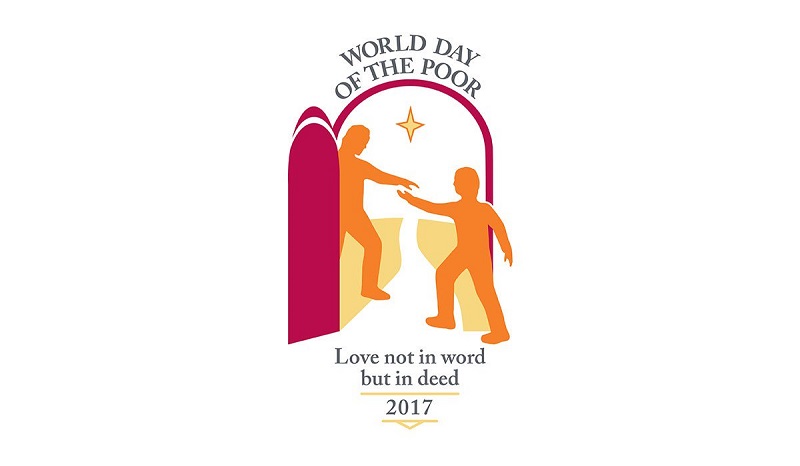
MESSAGE OF HIS HOLINESS POPE FRANCIS
FIRST WORLD DAY OF THE POOR
33rd Sunday in Ordinary Time
19 November 2017
Let us love, not with words but with deeds
1. “Little children, let us not love in word or speech, but in deed and in truth” (1 Jn 3:18). These words of the Apostle John voice an imperative that no Christian may disregard. The seriousness with which the “beloved disciple” hands down Jesus’ command to our own day is made even clearer by the contrast between the empty words so frequently on our lips and the concrete deeds against which we are called to measure ourselves. Love has no alibi. Whenever we set out to love as Jesus loved, we have to take the Lord as our example; especially when it comes to loving the poor. The Son of God’s way of loving is well-known, and John spells it out clearly. It stands on two pillars: God loved us first (cf. 1 Jn 4:10.19), and he loved us by giving completely of himself, even to laying down his life (cf. 1 Jn 3:16).
Such love cannot go unanswered. Even though offered unconditionally, asking nothing in return, it so sets hearts on fire that all who experience it are led to love back, despite their limitations and sins. Yet this can only happen if we welcome God’s grace, his merciful charity, as fully as possible into our hearts, so that our will and even our emotions are drawn to love both God and neighbour. In this way, the mercy that wells up – as it were – from the heart of the Trinity can shape our lives and bring forth compassion and works of mercy for the benefit of our brothers and sisters in need.
2. “This poor man cried, and the Lord heard him” (Ps 34:6). The Church has always understood the importance of this cry. We possess an outstanding testimony to this in the very first pages of the Acts of the Apostles, where Peter asks that seven men, “full of the Spirit and of wisdom” (6:3), be chosen for the ministry of caring for the poor. This is certainly one of the first signs of the entrance of the Christian community upon the world’s stage: the service of the poor. The earliest community realized that being a disciple of Jesus meant demonstrating fraternity and solidarity, in obedience to the Master’s proclamation that the poor are blessed and heirs to the Kingdom of heaven (cf. Mt 5:3).
“They sold their possessions and goods and distributed them to all, as any had need” (Acts 2:45). In these words, we see clearly expressed the lively concern of the first Christians. The evangelist Luke, who more than any other speaks of mercy, does not exaggerate when he describes the practice of sharing in the early community. On the contrary, his words are addressed to believers in every generation, and thus also to us, in order to sustain our own witness and to encourage our care for those most in need. The same message is conveyed with similar conviction by the Apostle James. In his Letter, he spares no words: “Listen, my beloved brethren. Has not God chosen those who are poor in the world to be rich in faith and heirs of the kingdom that he has promised to those who love him? But you have dishonoured the poor man. Is it not the rich who oppress you, and drag you into court? ... What does it profit, my brethren, if a man says he has faith but has not works? Can his faith save him? If a brother or sister is poorly clothed and in lack of daily food, and one of you says to them, ‘Go in peace, be warmed and filled”, without giving them the things needed for the body; what does it profit? So faith by itself, if it has not works, is dead’ (2:5-6.14-17).
3. Yet there have been times when Christians have not fully heeded this appeal, and have assumed a worldly way of thinking. Yet the Holy Spirit has not failed to call them to keep their gaze fixed on what is essential. He has raised up men and women who, in a variety of ways, have devoted their lives to the service of the poor. Over these two thousand years, how many pages of history have been written by Christians who, in utter simplicity and humility, and with generous and creative charity, have served their poorest brothers and sisters!
The most outstanding example is that of Francis of Assisi, followed by many other holy men and women over the centuries. He was not satisfied to embrace lepers and give them alms, but chose to go to Gubbio to stay with them. He saw this meeting as the turning point of his conversion: “When I was in my sins, it seemed a thing too bitter to look on lepers, and the Lord himself led me among them and I showed them mercy. And when I left them, what had seemed bitter to me was changed into sweetness of mind and body” (Text 1-3: FF 110). This testimony shows the transformative power of charity and the Christian way of life.
We may think of the poor simply as the beneficiaries of our occasional volunteer work, or of impromptu acts of generosity that appease our conscience. However good and useful such acts may be for making us sensitive to people’s needs and the injustices that are often their cause, they ought to lead to a true encounter with the poor and a sharing that becomes a way of life. Our prayer and our journey of discipleship and conversion find the confirmation of their evangelic authenticity in precisely such charity and sharing. This way of life gives rise to joy and peace of soul, because we touch with our own hands the flesh of Christ. If we truly wish to encounter Christ, we have to touch his body in the suffering bodies of the poor, as a response to the sacramental communion bestowed in the Eucharist. The Body of Christ, broken in the sacred liturgy, can be seen, through charity and sharing, in the faces and persons of the most vulnerable of our brothers and sisters. Saint John Chrysostom’s admonition remains ever timely: “If you want to honour the body of Christ, do not scorn it when it is naked; do not honour the Eucharistic Christ with silk vestments, and then, leaving the church, neglect the other Christ suffering from cold and nakedness” (Hom. in Matthaeum, 50.3: PG 58).
We are called, then, to draw near to the poor, to encounter them, to meet their gaze, to embrace them and to let them feel the warmth of love that breaks through their solitude. Their outstretched hand is also an invitation to step out of our certainties and comforts, and to acknowledge the value of poverty in itself.
4. Let us never forget that, for Christ’s disciples, poverty is above all a call to follow Jesus in his own poverty. It means walking behind him and beside him, a journey that leads to the beatitude of the Kingdom of heaven (cf. Mt 5:3; Lk 6:20). Poverty means having a humble heart that accepts our creaturely limitations and sinfulness and thus enables us to overcome the temptation to feel omnipotent and immortal. Poverty is an interior attitude that avoids looking upon money, career and luxury as our goal in life and the condition for our happiness. Poverty instead creates the conditions for freely shouldering our personal and social responsibilities, despite our limitations, with trust in God’s closeness and the support of his grace. Poverty, understood in this way, is the yardstick that allows us to judge how best to use material goods and to build relationships that are neither selfish nor possessive (cf. Catechism of the Catholic Church, Nos. 25-45).
Let us, then, take as our example Saint Francis and his witness of authentic poverty. Precisely because he kept his gaze fixed on Christ, Francis was able to see and serve him in the poor. If we want to help change history and promote real development, we need to hear the cry of the poor and commit ourselves to ending their marginalization. At the same time, I ask the poor in our cities and our communities not to lose the sense of evangelical poverty that is part of their daily life.
5. We know how hard it is for our contemporary world to see poverty clearly for what it is. Yet in myriad ways poverty challenges us daily, in faces marked by suffering, marginalization, oppression, violence, torture and imprisonment, war, deprivation of freedom and dignity, ignorance and illiteracy, medical emergencies and shortage of work, trafficking and slavery, exile, extreme poverty and forced migration. Poverty has the face of women, men and children exploited by base interests, crushed by the machinations of power and money. What a bitter and endless list we would have to compile were we to add the poverty born of social injustice, moral degeneration, the greed of a chosen few, and generalized indifference!
Tragically, in our own time, even as ostentatious wealth accumulates in the hands of the privileged few, often in connection with illegal activities and the appalling exploitation of human dignity, there is a scandalous growth of poverty in broad sectors of society throughout our world. Faced with this scenario, we cannot remain passive, much less resigned. There is a poverty that stifles the spirit of initiative of so many young people by keeping them from finding work. There is a poverty that dulls the sense of personal responsibility and leaves others to do the work while we go looking for favours. There is a poverty that poisons the wells of participation and allows little room for professionalism; in this way it demeans the merit of those who do work and are productive. To all these forms of poverty we must respond with a new vision of life and society.
All the poor – as Blessed Paul VI loved to say – belong to the Church by “evangelical right” (Address at the Opening of the Second Session of the Second Vatican Ecumenical Council, 29 September 1963), and require of us a fundamental option on their behalf. Blessed, therefore, are the open hands that embrace the poor and help them: they are hands that bring hope. Blessed are the hands that reach beyond every barrier of culture, religion and nationality, and pour the balm of consolation over the wounds of humanity. Blessed are the open hands that ask nothing in exchange, with no “ifs” or “buts” or “maybes”: they are hands that call down God’s blessing upon their brothers and sisters.
6. At the conclusion of the Jubilee of Mercy, I wanted to offer the Church a World Day of the Poor, so that throughout the world Christian communities can become an ever greater sign of Christ’s charity for the least and those most in need. To the World Days instituted by my Predecessors, which are already a tradition in the life of our communities, I wish to add this one, which adds to them an exquisitely evangelical fullness, that is, Jesus’ preferential love for the poor.
I invite the whole Church, and men and women of good will everywhere, to turn their gaze on this day to all those who stretch out their hands and plead for our help and solidarity. They are our brothers and sisters, created and loved by the one Heavenly Father. This Day is meant, above all, to encourage believers to react against a culture of discard and waste, and to embrace the culture of encounter. At the same time, everyone, independent of religious affiliation, is invited to openness and sharing with the poor through concrete signs of solidarity and fraternity. God created the heavens and the earth for all; yet sadly some have erected barriers, walls and fences, betraying the original gift meant for all humanity, with none excluded.
7. It is my wish that, in the week preceding the World Day of the Poor, which falls this year on 19 November, the Thirty-third Sunday of Ordinary Time, Christian communities will make every effort to create moments of encounter and friendship, solidarity and concrete assistance. They can invite the poor and volunteers to take part together in the Eucharist on this Sunday, in such a way that there be an even more authentic celebration of the Solemnity of Our Lord Jesus Christ, Universal King, on the following Sunday. The kingship of Christ is most evident on Golgotha, when the Innocent One, nailed to the cross, poor, naked and stripped of everything, incarnates and reveals the fullness of God’s love. Jesus’ complete abandonment to the Father expresses his utter poverty and reveals the power of the Love that awakens him to new life on the day of the Resurrection.
This Sunday, if there are poor people where we live who seek protection and assistance, let us draw close to them: it will be a favourable moment to encounter the God we seek. Following the teaching of Scripture (cf. Gen 18:3-5; Heb 13:2), let us welcome them as honoured guests at our table; they can be teachers who help us live the faith more consistently. With their trust and readiness to receive help, they show us in a quiet and often joyful way, how essential it is to live simply and to abandon ourselves to God’s providence.
8. At the heart of all the many concrete initiatives carried out on this day should always be prayer. Let us not forget that the Our Father is the prayer of the poor. Our asking for bread expresses our entrustment to God for our basic needs in life. Everything that Jesus taught us in this prayer expresses and brings together the cry of all who suffer from life’s uncertainties and the lack of what they need. When the disciples asked Jesus to teach them to pray, he answered in the words with which the poor speak to our one Father, in whom all acknowledge themselves as brothers and sisters. The Our Father is a prayer said in the plural: the bread for which we ask is “ours”, and that entails sharing, participation and joint responsibility. In this prayer, all of us recognize our need to overcome every form of selfishness, in order to enter into the joy of mutual acceptance.
9. I ask my brother Bishops, and all priests and deacons who by their vocation have the mission of supporting the poor, together with all consecrated persons and all associations, movements and volunteers everywhere, to help make this World Day of the Poor a tradition that concretely contributes to evangelization in today’s world. This new World Day, therefore, should become a powerful appeal to our consciences as believers, allowing us to grow in the conviction that sharing with the poor enables us to understand the deepest truth of the Gospel. The poor are not a problem: they are a resource from which to draw as we strive to accept and practise in our lives the essence of the Gospel.
From the Vatican, 13 June 2017
Memorial of Saint Anthony of Padua
Francis
© Copyright - Libreria Editrice Vaticana
Message in PDF Version here:
- CARITAS Zambia Bulletin 2nd Edition 2017
- Ensure the Right to Food, protect Human Dignity everywhere: make Migration a free choice, not a necessity
- Caritas Zambia Scoops "Best NGO Exhibit"
- Caritas Zambia expresses concern over the crop marketing situation in Zambia and challenges government to promote low input agriculture
- Seeking Benefits and Avoiding Conflicts: A Community – Company - Government Assessment of Copper Mining in Solwezi
- COMMUNIQUE: Recommendations from the 6th Zambia Alternative Mining Indaba 20-22 June, 2017
- A Statement by the three Church Mother Bodies on the State of the Nation
- Keynote speech for the first provincial mining indaba presented by the Vicar General, of the catholic diocese of Solwezi at Bishop Potani lodge on Wednesday 6th June, 2017
- Caritas Zambia 2017, 1st Quarter Bulletin
- If You Want Peace, Work For Justice (Paul VI) – Zambia Conference of Catholic Bishops
About Caritas Zambia
Caritas Zambia is a Catholic Organisation that is an integral structure of the Zambia Conference of Catholic Bishops (ZCCB). The Conference of Bishops is a permanent grouping of Bishops of a given nation or territory that jointly exercises certain pastoral functions on behalf of the Christian faithful of their territory. This is done for the sake of effective evangelisation. To promote the principle of the common good which the Church offers humankind, especially through forms and programmes of the apostolate which are fittingly adapted to the circumstances of the time and place, is the role of Bishops.
Kapingila Hse, Kabulonga Rd, Plot BRT6, P.O.Box 31965, Lusaka 10101, Zambia.
Tel: +260-211-260980 | +260-211-261789


